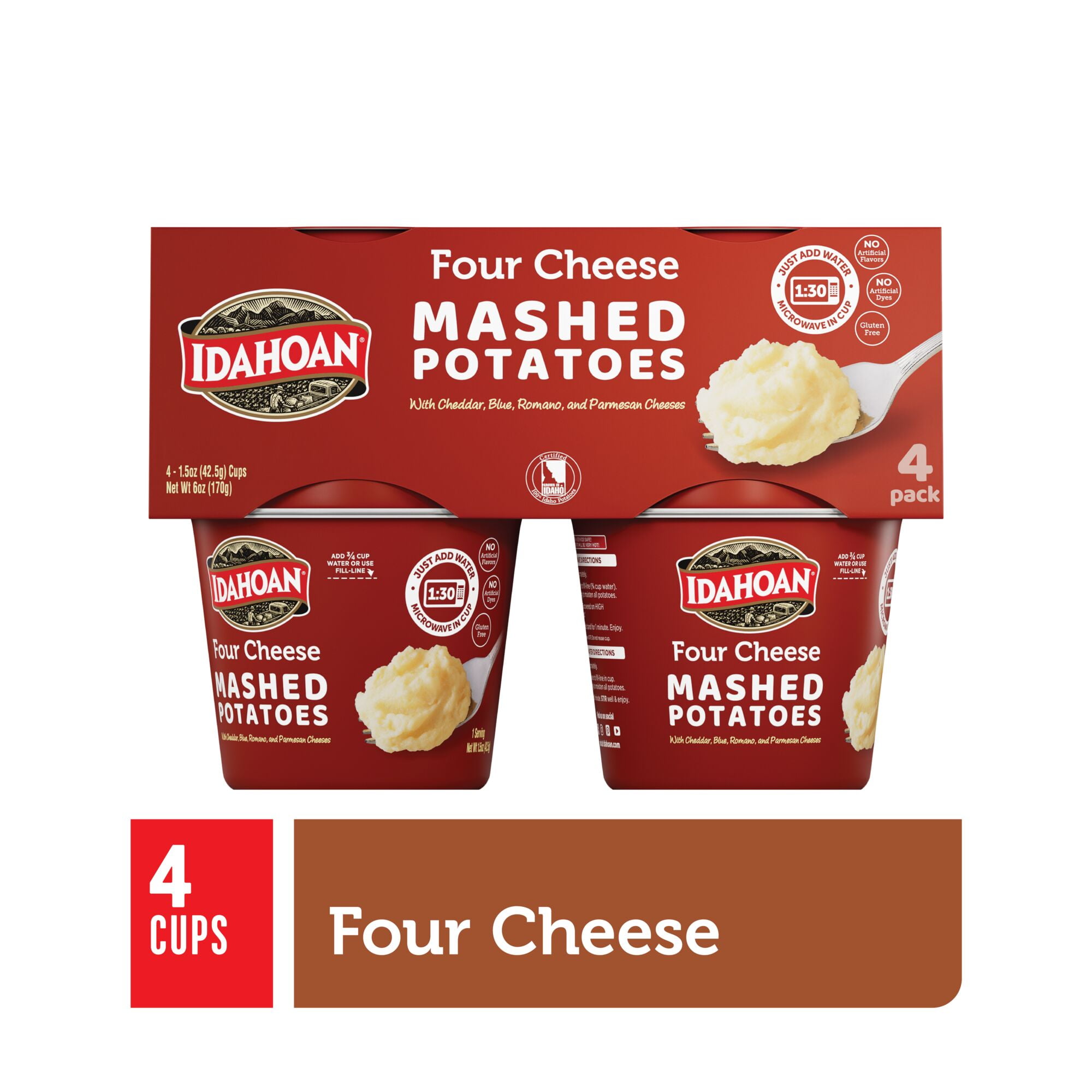Is Idahoan Four Cheese Mashed Potatoes - Gluten-Free, Real Idaho Potatoes - 4 Cups (1.5-Ounces Each) Gluten Free?

Description
Ready-to-serve mashed potatoes offer a savory, creamy flavor and smooth, slightly fluffy texture, with quick reconstitution from individual cups. Commonly used as a weeknight side, holiday accompaniment, casserole ingredient or topping, reviewers praise consistent convenience and taste; some note saltiness or a slightly processed mouthfeel, others highlight easy portion cups.

Description
Ready-to-serve mashed potatoes offer a savory, creamy flavor and smooth, slightly fluffy texture, with quick reconstitution from individual cups. Commonly used as a weeknight side, holiday accompaniment, casserole ingredient or topping, reviewers praise consistent convenience and taste; some note saltiness or a slightly processed mouthfeel, others highlight easy portion cups.
Ingredients
Idaho Potatoes, Flour Cheese Blend (Cheddar Cheese Blend (Whey, Maltodextrin, Reduced Lactose Whey, Canola Oil Cheddar And Blue Cheese (Cultured Milk, Salt, Enzymes), Salt, Disodium Phosphate, Whey Protein Concentrate, Citric Acid, Lactic Acid, Artificial Color (Including Fd&c Yellow 6 And 5)), Romano And Parmesan Cheeses (Pasteurized Milk, Cheese Cultures, Salt, Enzymes, Disodium Phosphate)), Vegetable Oil (Contains One Or More Of The Following: Coconut, Palm, Soybean, Cottonseed, Sunflower, Canola), Salt, Corn Syrup Solids, Sugar, Whey Powder, Nonfat Dry Milk, Natural And Artificial Flavor (Milk, Soy), Maltodextrin, Mono And Diglycerides, Calcium Stearoyl Lactylate, Spice Artificial Color (Including Fd&c Yellow 5 And 6), Sodium Acid Pyrophosphate (Preserve Freshness), Sodium Bisulfite (Preserve Freshness), Citric Acid (Preserve Freshness), Sodium Caseinate, Dipotassium Phosphate, Disodium Inosinate, Disodium Guanylate, Mixed Tocopherols (Preserve Freshness), Less Than 2, Silicon Dioxide Added As An Anti-caking Agent
What is a Gluten Free diet?
A gluten-free diet excludes all foods containing gluten, a protein found in wheat, barley, rye, and their derivatives. It's essential for people with celiac disease, gluten intolerance, or wheat allergy, as consuming gluten can trigger inflammation and digestive issues. Common gluten-containing foods include bread, pasta, cereals, and baked goods, though many gluten-free alternatives now exist using rice, corn, or almond flour. Beyond medical necessity, some people choose a gluten-free lifestyle for perceived health benefits, though experts emphasize the importance of maintaining a balanced diet rich in fiber, vitamins, and minerals when eliminating gluten-containing grains.
Similar Products
Idahoan Gluten Free Four Cheese Mashed Potatoes - 4oz
Idahoan Buttery Homestyle Mashed Potatoes - Gluten-Free, Real Idaho Potatoes - 4 Cups (1.5-Ounces Each)
Idahoan Roasted Garlic Mashed Potatoes - Gluten-Free, Real Idaho Potatoes - 1 Pouch (4 Servings)
Idahoan Buttery Homestyle Mashed Potatoes - Gluten-Free, Real Idaho Potatoes - 1 Cup (1.5-Ounces)
Idahoan Sour Cream and Chives Mashed Potatoes - Gluten-Free, Real Idaho Potatoes - 1 Pouch (4 Servings)


